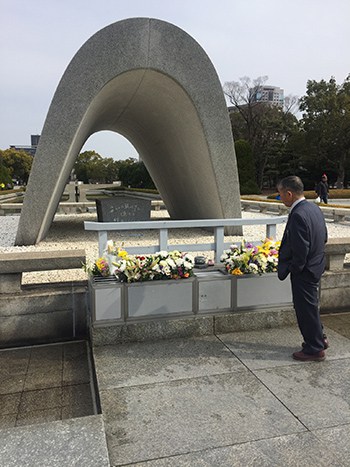Davis Green: Civility, infrastructure and warfare in Japan
 As I reflect on my weeks in Japan, a few learnings stand out:
As I reflect on my weeks in Japan, a few learnings stand out:
- The Japanese people are ideally civilized. Orderly conduct is the general rule of thumb. You are expected to respect your fellow citizens and (fortunately for me and my classmates) even go out of your way to help tourists. There are many tangible examples of this: everyone is quiet on the metro, so as not to disturb fellow passengers, everyone walks in an orderly fashion (mainly on the left side of the sidewalk or stairs) and if you ask a question, the Japanese often do their absolute best to help you find an answer. For those who love organization, Japan could be your Holy Grail.
- Tokyo’s infrastructure is more efficient and advanced than our own. My husband and I paid attention, and the only time a form of transportation was ever late was a random mountain bus during the morning rush, and it was only delayed by five minutes. We took every form of transportation possible in Japan: planes, buses, bullet trains (@200KM/hr), metros, ropeways and even a pirate ship on Lake Ashi. Everything was clean (imagine the NYC subway being clean!), on time and relatively advanced. Most people utilized these systems because of this efficiency, and as a result, surface road traffic was light in the metro area of nearly 30 million people!
 High school students should more acutely learn the reality of nuclear warfare. While in Hiroshima, I was exposed to the reality of nuclear warfare while visiting ground zero and the Hiroshima Peace Memorial Museum. When you hear the numbers of those lost in the bombings, you gain some understanding of the tragedy. However, when you hear survivor stories and realize how the bomb affected civilians, many of which were children, both during the initial attack (burning most and traumatically wounding most others) and after the attack (radiation poisoning that affected multiple generations of survivors), you are better able to truly grasp the devastating impact this weapon caused and the importance of preventing nuclear proliferation.
High school students should more acutely learn the reality of nuclear warfare. While in Hiroshima, I was exposed to the reality of nuclear warfare while visiting ground zero and the Hiroshima Peace Memorial Museum. When you hear the numbers of those lost in the bombings, you gain some understanding of the tragedy. However, when you hear survivor stories and realize how the bomb affected civilians, many of which were children, both during the initial attack (burning most and traumatically wounding most others) and after the attack (radiation poisoning that affected multiple generations of survivors), you are better able to truly grasp the devastating impact this weapon caused and the importance of preventing nuclear proliferation.
- The Japanese-American relationship is valued. During this emotional trip to Hiroshima, I also learned that the Japanese don’t harbor resentment after the nuclear bombings of Hiroshima and Nagasaki in part because of the successful development efforts the United States and our Allies led to help the Japanese government and economy thrive. There are many lessons to learn from this situation, especially as we expand efforts in the Middle East or attempt to disengage from overseas conflicts. Japan is truly an exit strategy success story. One key question is: If we can’t duplicate this kind of success in a nation after a war, should we engage?
These are big thoughts and questions drawn from one intense experience, yet this is the beauty of travel.

 High school students should more acutely learn the reality of nuclear warfare. While in Hiroshima, I was exposed to the reality of nuclear warfare while visiting ground zero and the Hiroshima Peace Memorial Museum. When you hear the numbers of those lost in the bombings, you gain some understanding of the tragedy. However, when you hear survivor stories and realize how the bomb affected civilians, many of which were children, both during the initial attack (burning most and traumatically wounding most others) and after the attack (radiation poisoning that affected multiple generations of survivors), you are better able to truly grasp the devastating impact this weapon caused and the importance of preventing nuclear proliferation.
High school students should more acutely learn the reality of nuclear warfare. While in Hiroshima, I was exposed to the reality of nuclear warfare while visiting ground zero and the Hiroshima Peace Memorial Museum. When you hear the numbers of those lost in the bombings, you gain some understanding of the tragedy. However, when you hear survivor stories and realize how the bomb affected civilians, many of which were children, both during the initial attack (burning most and traumatically wounding most others) and after the attack (radiation poisoning that affected multiple generations of survivors), you are better able to truly grasp the devastating impact this weapon caused and the importance of preventing nuclear proliferation.